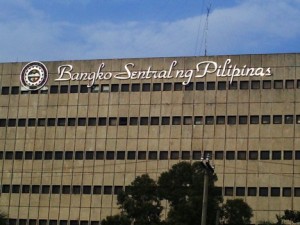The central bank has called for changes in its charter—ranging from exemptions from all forms of taxes to a fourfold increase in its capitalization—to improve its ability to ensure the stability of the Philippine economy and that of the financial system.
The Bangko Sentral ng Pilipinas (BSP) has outlined a fresh set of proposed amendments to its 30-year-old charter that was recently submitted to both houses of Congress.
Apart from provisions that aim to improve the BSP’s own financial situation, the BSP also asked for the restoration of some powers that the institution lost when it was reorganized to replace the old Central Bank of the Philippines in 1993.
These include the immunity from suits for all BSP personnel acting in good faith and exemption from restrictions under deposit secrecy laws.
“The BSP’s version of the amendments has been adopted by the [Aquino] administration as a priority bill,” BSP Deputy Governor Vicente Aquino told reporters on Saturday.
Aquino said Sen. Serge Osmeña, chair of the Senate committee on banks, has agreed to be the bill’s principal sponsor and author. Similarly, Rep. Sonny Collantes, chair of the committee on banks and financial intermediaries, has agreed to do the same at the House of Representatives.
Copies of the new set of amendments to the BSP charter, which was approved by the BSP’s Monetary Board earlier this month, was also sent to the Presidential Legislative Liason’s Office (PLLO) and the Legislative-Executive Development Advisory Council (Ledac), Aquino said.
Three other congressmen, namely Sergio Apostol, Karlo Nograles and Marcelino Teodoro, have also agreed to consolidate the separate bills on BSP charter amendments with the BSP’ version.
One of the key provisions—out of 19 amendments in 30 sections sought by the BSP—includes the proposal to increase the BSP’s capitalization by P150 billion, payable in three years if the bill is passed into law. This will be on top of the BSP’s existing maximum allowed capitalization of P50 billion, of which P40 billion is paid up.
“The increase will enhance the BSP’s administrative and fiscal autonomy. During the conduct of its monetary policy, the BSP confronts financial risks and costs that result from policy decisions of the Monetary Board,” Aquino said.
The fear, he said, was that the BSP would share the fate of the old central bank: Bankruptcy. The BSP incurred a net loss of P95.38 billion in 2012, nearly triple the P33.69 billion recorded the previous year. In 2010, the central bank registered a net loss of P59.04 billion.
This came as the BSP spent more money to buy dollars from the market to combat spikes in the peso’s value, among other reasons.
Aquino said exemptions from taxes would also help the BSP save money that it needed to regulate banks and keep prices stable.
In the area of bank regulations, immunity from lawsuits for personnel would allow the BSP to perform its function as regulator of local banks and other financial institutions without fear of being harassed.
“We would not be distracted by harassment suits and the like so they can focus on the discharge of the BSP’s mandate,” Aquino said.
“The absence of this [immunity] have emboldened [the accused banks] to hit back at those BSP officials who were just performing their duties in good faith,” he added.
Meanwhile, exemptions from deposit secrecy laws would also allow the BSP to check if banks are compliant with anti-money laundering laws.
While it leaves investigations on individuals suspected of money laundering to the Anti-Money Laundering Council (AMLC), the BSP penalizes banks that do not comply with reporting rules.
